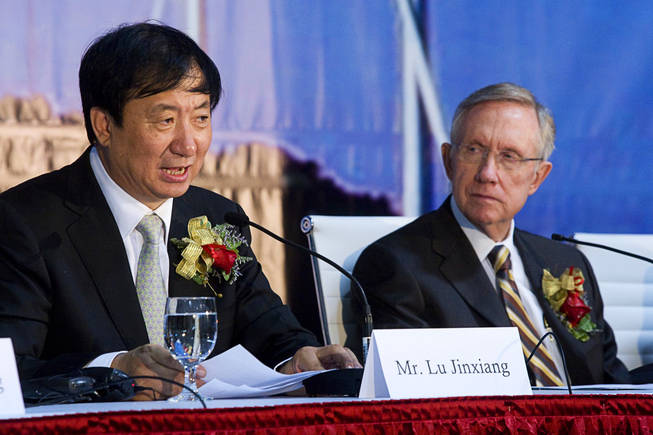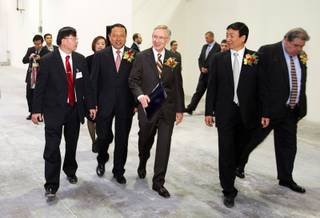
Jinxiang Lu, left, chairman and CEO of A-Power, speaks during the dedication of a new A-Power Energy Generation Systems manufacturing facility in Henderson on Oct. 12, 2010. Senate Majority Leader Harry Reid listens at right.
Tuesday, April 19, 2011 | 2 a.m.
Sun coverage
Sun archives
- Federal budget battle waged over women, seniors (4-18-2011)
- Obama’s plan to reduce deficit frames tax battle (4-13-2011)
- Debate over health care still far from a resolution (4-6-2011)
- 2012 hopefuls tread carefully on Ryan budget (4-6-2011)
- Parties split as House panel OKs 2012 GOP budget (4-6-2011)
- How the House GOP budget affects health care (4-5-2011)
- GOP budget plan would revamp Medicare, Medicaid (4-5-2011)
- On Medicare? Try the next office (12-2-2010)
Senate Majority Leader Harry Reid is visiting China this month as part of a delegation with tense diplomatic issues on the agenda, including trade and human rights. But the key issue for Nevada is in an area in which the two countries appear to be moving closer together: energy.
China is the financial force behind a wind turbine manufacturing plant planned for Southern Nevada. A-Power Energy Generation Systems, expected to employ a thousand workers at a more than 300,000-square-foot facility made with 50,000 tons of U.S. steel, would be the first such investment by a Chinese company in the United States.
The project is being conducted with local partners the U.S. Renewable Energy Group and American Nevada Company, owned by The Greenspun Corporation, which also owns the Las Vegas Sun.
Reid and other politicians have indicated they believe the A-Power wind company, which would build wind turbines to be used across the country, starting in Texas, could serve as a model for investments from China, which has one thing that U.S. markets don’t right now: cash.
The delegation isn’t going to China with an open hand: The visit is officially a fact-finding mission with no immediate promise of any new business ventures, although the group will be doing “site visits of American investments and clean energy projects in Chengdu, Beijing and Xi’an,” according to Reid’s office.
But China has shown interest in stepping up investments in the United States, particularly in renewable energy projects. That’s important to U.S. companies that have found little private capital for new ventures, leaving many reliant on government grants and loan guarantee programs.
There are two competing issues at play in the background of this China deal — and encouraging foreign investment generally — that go to the heart of ideological divides in Washington. One has to do with environmental aspirations. The other taxes.
As Congress moves deeper into discussions about how to correct the country’s snowballing deficit, a rift is forming between Republicans, who say they can balance the budget and fix the country’s debt problems by reconfiguring existing programs and making strategic cuts, and Democrats, who say only cutting the budget will do lasting damage to the country.
Top Republicans and President Barack Obama have traded shots over taxes; and although that discussion has focused on the individual tax code — the Bush-era tax cuts for top wage earners — momentum to change the corporate tax code is lurking.
Ways and Means Chairman Dave Camp — Nevada Reps. Shelley Berkley, a Democrat, and Dean Heller, a Republican, both serve on that committee — said last month he wanted to lower the corporate tax rate’s top threshold from 35 percent to 25 percent, as part of an overhaul.
The U.S. has the fourth-highest corporate tax rate in the world, a statistic that’s usually cited to explain, with frustration, why so many U.S. companies, and American jobs, have moved abroad. But the flip side is just as crucial, advocates of lowering the rate say: With a high corporate tax rate, it’s hard to attract companies to set up shop here.
Although Democrats have balked at the figure, they say that they’re up for lowering corporate rates provided that means ending some tax breaks they say are pricey, such as those that go to the oil and gas industry.
But in Nevada’s case, Democratic congressional staffers argue, a country like China doesn’t come because of the taxes (although in Nevada, they are low); they come because of a ready workforce, geothermal hot spots, wind and sun.
There’s a catch there, too, according to energy experts. Although some experts see a healthy global market for clean energy technology, primarily fueled by countries’ efforts to do something about climate change, the United States is behind the curve because, as researchers for the major international bank HSBC recently noted: It has no clean energy or climate legislation. There’s little hope for such a bill to come out of the 112th Congress.
Energy Secretary Steven Chu tried to sound the alarm last year, as he implored the country not to miss its “Sputnik moment” in clean energy. But for now, solar, wind, and other renewable energy projects remain less competitive than traditional alternatives, meaning that it’s not growing fast enough to spark the energy renaissance that would follow A-Power investments in a place such as Nevada.
Still, Reid’s had some luck in drawing Chinese investment to his home state.
When the Chinese president was in the states in January, Reid emerged from the diplomatic visit with indications that things were progressing on the wind turbine project, as well as word that another Chinese energy company, the ENN Group, was considering making a major investment in a solar energy company in the area, likely in partnership with U.S.-based Duke Energy. Reid has pressed company executives to join an initiative to develop commercial solar energy projects in cities across the country.
Reid argues the local workforce is ready to take on such a project.


Join the Discussion:
Check this out for a full explanation of our conversion to the LiveFyre commenting system and instructions on how to sign up for an account.
Full comments policy